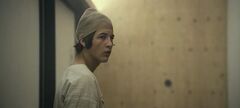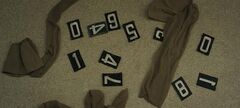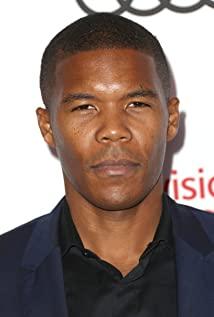There are a few shots that really impressed me.
First, the priest asked what is the name of 819? 819 answered "819" timidly. He was afraid of the authority of the "prison guard", he couldn't challenge it, and 8612, who was going to save him if he planned to escape, didn't come to save him, so he didn't dare to challenge it.
Second, when Jesse was accusing 1037, Jesse looked at a blank piece of paper and charged 1037's crimes like a series of cannons. I was wondering why the director wanted to give a close-up of the blank piece of paper on the table? Maybe it's the same as our "what if you want to add sin".
Third, when the "prison guard" was insulting the "prisoner" at the end, the "prison guard" sitting at the door took off his glasses and put them on the table. He also gave a close-up of the black sunglasses, and then blurred the rest of the scene, right? Say that when you put on those sunglasses, you change, the way you look at things changes, from the glasses to the heart.
Finally, Dr. Zimbardo, who was sitting in front of the monitor, couldn't stand it, watching the "prisoner" in insulting the "prisoner" and his line of defense was broken. The reason for his defeat and the conversation with his girlfriend in the corridor should have played a big role, before Zimbardo Maybe he didn't think that the "prisoners" were hurt so much, but in the end he realized that the "prisoners" were not experimental subjects, and those "prisoners" were not experimental subjects. In fact, I think it is not only the "prisoners" who are hurt, but also the "prison guards".
When "prison guards" put on uniforms, batons, and sunglasses, they change, because what they put on, what they put on, what they put on is power, they are "on the top", they see people as looking down.
When the "prisoners" were crushed after one or two resistances, they were only submissive, and the most they said was: yes, Mr. Instructor. They cannot resist but obey, and when they fail to resist, they can only obey.
Personally, I think this film is first because the environment changes you, and you highlight the other side of human nature. The side you don't know about yourself. You don't know how bad you're going to be, and you don't know what you're going to be as cowardly, until the ship's uniforms and prison uniforms. Everything changes when you put it on.
PS: You can recommend it to law enforcement. Let those unscrupulous law enforcement officers see that they will be better than the "prison guard" in the film after wearing that skin? But don't forget that the "prison guard" in the film only attacks verbally.
View more about The Stanford Prison Experiment reviews











